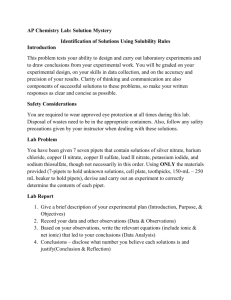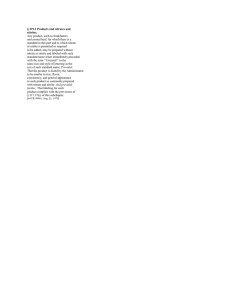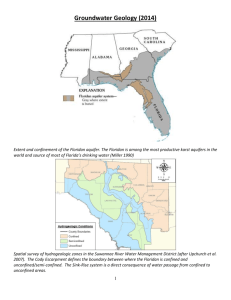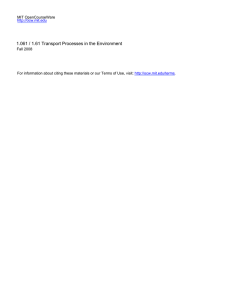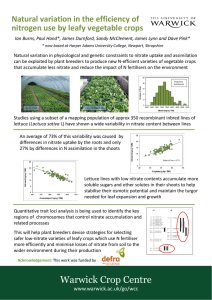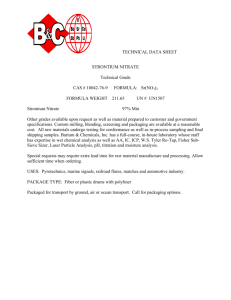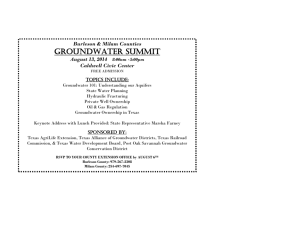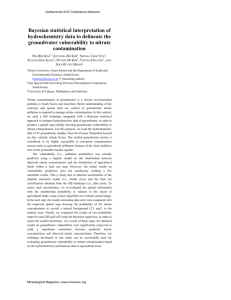Modeling the Impact of CAFOs on Nitrate Contamination of Water Wells
advertisement
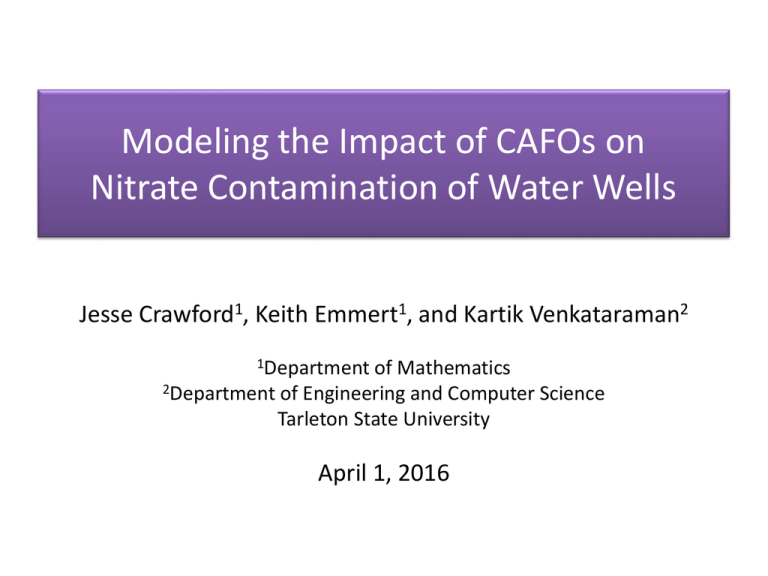
Modeling the Impact of CAFOs on Nitrate Contamination of Water Wells Jesse Crawford1, Keith Emmert1, and Kartik Venkataraman2 1Department of Mathematics 2Department of Engineering and Computer Science Tarleton State University April 1, 2016 Concentrated Animal Feed Operations • Spatially concentrated livestock production • Manure loading rates can exceed absorptive capacity of land • Nitrogen based fertilizers • Irrigation • Possible Result: Nitrate contamination of nearby groundwater Nitrate Contamination of Groundwater • Private wells on farms/ranches are used for drinking water • Health impacts of nitrate contamination • Blue-baby disease in infants (methemoglobinemia) • Miscarriages • Non-Hodgkin Lymphoma • Maximum Contaminant Level (MCL): 10 mg/L • Indicative of human inputs: 3 mg/L CAFO longitude/latitude c j (c j1 , c j 2 ), for j 1, ,86 Well longitude/latitude wi ( wi1 , wi 2 ), for i 1, ,344 Aj Waste application rate 1, if nitrate 3 mg/L Ni 0, if nitrate 3 mg/L Hydraulic Gradient with GIS Geographic Information System 348 x 466 Grid CAFO Flow Path CAFO Migration Score (CMS) dij distance from ith well to nearest point on jth flowpath Lij arc length from jth CAFO to nearest point Aj Waste application rate at jth CAFO K Epanechnikov kernel function 86 CMSi j 1 Aj K (dij ) 1 Lij CAFO Migration Score (CMS) 3 d 2 1 , for d b K (d ) 4 b 0, otherwise. dij distance from ith well to nearest point on jth flowpath Lij arc length from jth CAFO to nearest point Aj Waste application rate at jth CAFO K Epanechnikov kernel function 86 CMSi j 1 Aj K (dij ) 1 Lij Logistic Regression Model 1, if nitrate 3 mg/L Ni 0, if nitrate 3 mg/L gi 0 1CMSi Pr[ N i 1] 1 1 e gi Logistic Regression Model gi 0 1CMSi 1, if nitrate 3 mg/L Ni 0, if nitrate 3 mg/L Pr[ N i 1] Parameter Estimate Std. Error z value 1 1 e gi Pr(>│z│) β0 -2.86 0.307 -9.30 1.460E-20 β1 1.65E-05 2.41E-06 6.85 7.187E-12 Logistic Regression Model 1, if nitrate 3 mg/L Ni 0, if nitrate 3 mg/L gi 0 1CMSi Pr[Yi 1] 1 1 e gi Hosmer-Lemeshow Goodness-of-fit Test p-value = 0.43 Probability Thresholds Data Model Probability of Nitrate Contamination p̂ If pˆ p0 , then classification contaminated If pˆ p0 , then classification not contaminated ROC Curve Area under curve = 0.769 Future Research • Include more variables • Depth to Water Table • pH • Total Dissolved Solids • Percent Clay • Percent Organic Matter • Annual Rainfall • Model Improvements • Cross validation • Tune model parameters (kernel function, gamma) • Use other classification methods References Burkartaus, D.M.R., and Stoner, J.D. (2008). “Nitrogen in Groundwater Associated with Agricultural Systems.” In Nitrogen in the Environment: Sources, Problems and Management; ed. J.L. Hatfield and R.F. Follett. Publications from USDA-ARS/UNL Faculty, Paper 259. Harter, T., Davis, H., Matthews, M.C., and Meyer, R.D. (2002). “Shallow Groundwater Quality on Dairy Farms with Irrigated Forage Crops.” J. Contam. Hydrol., 55, 287-315. Hechenbichler K. and Schliep K.P. (2004). “Weighted k-Nearest-Neighbor Techniques and Ordinal Classification”, Discussion Paper 399, SFB 386, Ludwig-Maximilians University Munich (Dec 20, 2014). Hosmer, D., Lemeshow, S., and Sturdivant, R. (2013). Applied Logistic Regression, 3rd ed. John Wiley and Sons, Inc., Hoboken, NJ. References Lockhart, K.M., King, A.M., and Harter, T. (2013). “Identifying Sources of Groundwater Nitrate Contamination in a Large Alluvial Groundwater Basin with Highly Diversified Intensive Agricultural Production.” J. Contam. Hydrol., 151, 140-154. Mace, R.E., Chowdhury, A.H., Anaya, R., and Way, S.C. (2000). “A Numerical Groundwater Flow Model of the Upper and Middle Trinity Aquifer.” Hill Country Area: Texas Water Development Board Open File Report 00-02. McFarland, A., and Adams, T. (2007). “Semiannual Water Quality Report for the North Bosque River Watershed”. Texas Institute for Applied Environmental Research Technical Report 0701. McFarland, A. and Hauck, L. (1997). “Livestock and the Environment: A National Pilot Project Report on Stream Water Quality in the Upper North Bosque River Watershed.” Texas Institute for Applied Environmental Research Progress Report 97-03. References Muller, D.A., and McCoy, J.W. (1987). Groundwater Conditions of the Trinity Group Aquifer in Western Hays County. Texas Water Development Board. Nolan, B.T. (2001). “Relating Nitrogen Sources and Aquifer Susceptibility to Nitrate in Shallow Ground Waters of the United States.” J. Groundwater, 39(2), 290-299. Pederson, C.H., Kanwar, R., Helmers, M.J., and Mallarino, A.P. (2011). “Impact of Liquid Swine Manure Application and Cover Crops on Ground Water Quality.” Iowa State Research Farm Progress Reports, Paper 77. Rekha, P., Kanwar, R.S., Nayak, A.K., Hoang, C.K., and Pederson, C.H. (2011). “Nitrate Leaching to Shallow Groundwater Systems from Agricultural Fields with Different Management Practices.” J. Environ. Monit., 13, 2550-2558. References Texas Commission on Environmental Quality (2014). Water Quality General Permits Search. (Mar 06 2014). Texas Water Development Board (2014). TWDB Groundwater Database Reports. (Mar 06 2014). Texas Water Development Board (2014). Water for Texas – 2012 State Water Plan. Texas Water Development Board, Austin, TX. Twarakavi, N.K.C., and Kaluarachchi, J.K. (2005). “Aquifer Vulnerability Assessment to Heavy Metals using Ordinal Logistic Regression.” Groundwater, 43, 200-214. Venkataraman, K., and Uddameri, V. (2012). “Modeling Simultaneous Exceedance of Drinking-water Standards of Arsenic and Nitrate in the Southern Ogallala Aquifer using Multinomial Logistic Regression.” J. Hydrol., 458-459, 16-27. Thank You!
